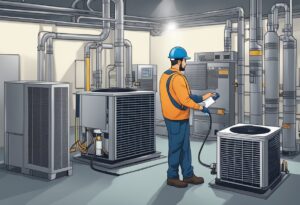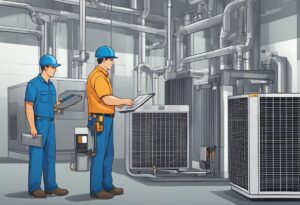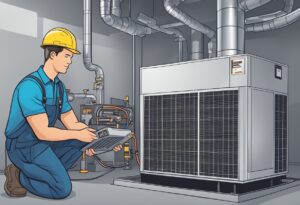Regular HVAC check-ups are essential to maintaining the efficiency of your heating, ventilation, and air conditioning system. HVAC systems are responsible for regulating the temperature and air quality in your home or office, and without proper maintenance, they can become less efficient, which can lead to higher energy bills and reduced comfort levels. Regular check-ups can help prevent costly breakdowns and extend the life of your system.

During an HVAC check-up, a professional technician will inspect and clean your system, identifying any potential issues before they become major problems. This includes checking the filters, ductwork, and electrical components, as well as ensuring that the system is operating at peak efficiency. Regular check-ups can also help improve indoor air quality, as a dirty or clogged system can circulate dust, allergens, and other pollutants throughout your home or office.
By investing in regular HVAC check-ups, you can save money on energy bills, avoid costly repairs, and ensure that your system is operating at peak efficiency. Don’t wait until your system breaks down to call a technician – schedule regular maintenance today and enjoy the benefits of a comfortable, efficient home or office.
Understanding HVAC Systems

Components and Functionality
Heating, ventilation, and air conditioning (HVAC) systems are essential for maintaining comfortable indoor temperatures and air quality. These systems consist of several components that work together to regulate temperature, humidity, and air circulation.
The primary components of an HVAC system include a thermostat, furnace or heat pump, air conditioner, ductwork, and vents. The thermostat controls the temperature by signaling the furnace or heat pump to turn on when the temperature drops below the desired level. The furnace or heat pump then heats the air, which is distributed through the ductwork and vents.
The air conditioner works in a similar fashion, but it cools the air instead of heating it. The air conditioner removes heat and humidity from the air, which is then circulated through the ductwork and vents. The ductwork is responsible for distributing the heated or cooled air throughout the building, while the vents regulate the airflow and temperature in each room.
Types of HVAC Systems
There are several types of HVAC systems, each with its own advantages and disadvantages. The most common types of HVAC systems include:
- Split systems: These systems have separate components for heating and cooling, which are connected by refrigerant lines. They are ideal for homes with limited space or no ductwork.
- Packaged systems: These systems have all components housed in a single unit, which is typically installed on the roof or outside the building. They are ideal for larger buildings or commercial spaces.
- Ductless systems: These systems do not require ductwork and are ideal for retrofitting older buildings or for spaces where ductwork is not feasible.
Regular check-ups are essential for ensuring that HVAC systems function efficiently. A professional HVAC technician can inspect the system, identify any issues, and make necessary repairs or adjustments. By scheduling regular check-ups, building owners can prevent costly breakdowns and ensure that their HVAC systems operate at peak efficiency.
Benefits of Regular Maintenance

Regular HVAC check-ups are essential for the efficient operation of your system. Here are some of the benefits of regular maintenance:
Energy Efficiency
Regular maintenance of your HVAC system can significantly improve its energy efficiency. According to the U.S. Department of Energy, a well-maintained HVAC system can save up to 30% on energy bills. During a maintenance check-up, a technician will inspect and clean the system’s components, ensuring that it operates at peak efficiency. This will not only save energy but also reduce your carbon footprint.
Extended Lifespan
Regular maintenance can also extend the lifespan of your HVAC system. A well-maintained system will experience less wear and tear, reducing the likelihood of breakdowns and costly repairs. In addition, regular maintenance can help identify potential issues before they become major problems, allowing for timely repairs and avoiding premature system failure.
Improved Air Quality
Regular maintenance can also improve the air quality in your home or office. During a maintenance check-up, a technician will clean the system’s components, including the air filters, which can become clogged with dirt, dust, and other contaminants. This can improve indoor air quality by reducing the amount of airborne pollutants and allergens circulating in the air.
In summary, regular HVAC check-ups are essential for maintaining the efficiency, lifespan, and air quality of your system. By scheduling regular maintenance, you can save money on energy bills, avoid costly repairs, and breathe cleaner air.
Common HVAC Problems and Diagnostics
Regular check-ups can help identify and fix common HVAC problems before they become major issues. Here are some of the most common problems and diagnostics that HVAC technicians look for during routine maintenance.
Thermostat Issues
Thermostat issues are a common problem that can cause HVAC systems to malfunction. Faulty thermostats can cause the system to turn on and off at the wrong times, leading to wasted energy and increased utility bills. HVAC technicians can diagnose thermostat issues by checking the wiring, replacing batteries, and ensuring that the thermostat is properly calibrated.
Airflow Complications
Poor airflow is another common HVAC problem that can cause the system to work harder than it needs to. This can lead to increased wear and tear on the system and decreased efficiency. HVAC technicians can diagnose airflow issues by checking the air filter, ductwork, and blower motor.
Mechanical Wear and Tear
Over time, HVAC systems can experience mechanical wear and tear that can cause them to break down or lose efficiency. Common mechanical issues include worn belts, loose connections, and dirty coils. HVAC technicians can diagnose these issues during routine check-ups and perform repairs to keep the system running smoothly.
Regular HVAC check-ups are essential for maintaining system efficiency and preventing costly breakdowns. By addressing common HVAC problems and performing routine maintenance, homeowners can keep their systems running smoothly for years to come.
Maintenance Checklist
Regular HVAC check-ups are crucial for ensuring the efficiency of the system. Here is a maintenance checklist that includes the three most important tasks that should be performed during a check-up:
Filter Replacement
The HVAC filter is responsible for capturing dust, debris, and other particles that can reduce the efficiency of the system. Filters should be replaced every 1-3 months, depending on the type of filter and the level of usage. Neglecting to replace the filter can lead to clogging, which can cause the system to work harder and use more energy.
Coil Cleaning
The coils in an HVAC system are responsible for transferring heat. Over time, dirt, dust, and other debris can accumulate on the coils, reducing their efficiency. During a check-up, the technician will clean the coils to ensure that they are functioning properly. This can help to reduce energy usage and prolong the life of the system.
System Testing
During a check-up, the technician will also perform a series of tests to ensure that the system is functioning properly. This may include checking the refrigerant levels, testing the thermostat, and inspecting the electrical connections. Any issues that are identified can be addressed before they lead to more serious problems.
By following this maintenance checklist, homeowners can ensure that their HVAC system is functioning at peak efficiency. Regular check-ups can also help to identify and address any issues before they become more serious, which can save homeowners money in the long run.
Professional Servicing vs. DIY
Regular HVAC check-ups are vital to ensure optimal system efficiency and prevent costly repairs. However, homeowners often face the dilemma of whether to hire a professional or perform the tasks themselves. Here are some things to consider when deciding between professional servicing and DIY.
When to Hire a Professional
While some HVAC maintenance tasks can be done by homeowners, certain tasks require professional expertise. For instance, complex repairs, refrigerant handling, and electrical work should be left to licensed technicians. Additionally, if the system is still under warranty, attempting DIY repairs can void the warranty.
Another reason to hire a professional is for safety reasons. HVAC systems involve electrical components, sharp edges, and moving parts that can be dangerous if mishandled. Professionals have the necessary training, equipment, and experience to handle these hazards.
Tasks You Can Perform Yourself
Homeowners can perform some HVAC maintenance tasks themselves to improve system efficiency and prolong its lifespan. These tasks include:
- Changing air filters regularly
- Cleaning the outdoor unit
- Clearing debris from around the outdoor unit
- Checking and adjusting thermostat settings
- Lubricating moving parts
- Checking for leaks in ductwork
Performing these tasks regularly can help prevent breakdowns and reduce energy bills. However, it’s important to follow the manufacturer’s instructions and safety guidelines when performing DIY maintenance.
In conclusion, homeowners can perform some HVAC maintenance tasks themselves, but others require professional expertise. Hiring a licensed technician for complex repairs, refrigerant handling, and electrical work can prevent safety hazards and voiding of warranties. Regular HVAC maintenance is essential to keep the system running efficiently and prevent costly repairs.
Optimizing Your HVAC System
Regular HVAC check-ups are crucial to maintaining the efficiency of your system and ensuring it operates at peak performance. However, there are additional steps you can take to optimize your HVAC system and improve its energy efficiency.
Upgrades and Innovations
One way to optimize your HVAC system is to upgrade it with the latest innovations. For example, replacing an old, inefficient air conditioning unit with a new, energy-efficient model can significantly reduce your energy costs. Similarly, upgrading your furnace or boiler with a more efficient model can also save you money on your energy bills.
Another upgrade to consider is installing a programmable thermostat. This allows you to set your HVAC system to automatically adjust the temperature based on your schedule, so you’re not wasting energy cooling or heating an empty home.
Smart Thermostats and Controls
Smart thermostats and controls take this a step further, allowing you to remotely control your HVAC system from your smartphone or tablet. This means you can adjust the temperature of your home even when you’re away, ensuring it’s comfortable when you return.
Some smart thermostats even learn your habits and adjust the temperature automatically based on your preferences. This can help you save even more money on your energy bills, as your HVAC system will only run when it’s needed.
By optimizing your HVAC system with upgrades and innovations, you can improve its energy efficiency and save money on your energy bills. Plus, with the convenience of smart thermostats and controls, you can ensure your home is always comfortable, no matter where you are.
Seasonal HVAC Considerations
Preparing for Summer
Regular HVAC check-ups are crucial to ensure that the system is running efficiently and effectively. As the summer months approach, it is important to prepare the HVAC system for the increased workload. One of the most important things to do is to clean or replace the air filters. Dirty filters can reduce the airflow, causing the system to work harder and reducing its efficiency. Additionally, cleaning the outdoor unit can help to remove any debris that may have accumulated during the winter months.
Another important consideration is to check the refrigerant levels. If the levels are low, the system will have to work harder to cool the air, reducing its efficiency. It is also important to check the thermostat settings to ensure that the system is running at the right temperature. A programmable thermostat can help to save energy and increase efficiency by automatically adjusting the temperature based on the time of day.
Winterizing Your System
As the winter months approach, it is important to winterize the HVAC system to ensure that it is running efficiently and effectively. One of the most important things to do is to check the air filters. Dirty filters can reduce the airflow, causing the system to work harder and reducing its efficiency. Additionally, cleaning the outdoor unit can help to remove any debris that may have accumulated during the summer months.
Another important consideration is to check the thermostat settings to ensure that the system is running at the right temperature. A programmable thermostat can help to save energy and increase efficiency by automatically adjusting the temperature based on the time of day. It is also important to check the ductwork for leaks. Leaks can cause the system to work harder to maintain the desired temperature, reducing its efficiency. Sealing any leaks can help to improve the efficiency of the system.
Regular HVAC check-ups are essential to ensure that the system is running at peak efficiency. By taking the time to prepare the system for the summer and winter months, homeowners can save money on energy bills and extend the lifespan of their HVAC system.

0 Comments